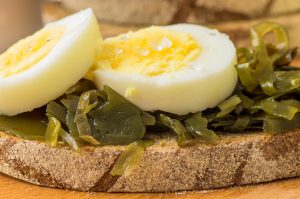 Iodine deficiency plays a role in goiters, hypothyroidism and pregnancy-related problems. Iodine is an essential element necessary for proper bodily functions, especially in regards to the thyroid.
Iodine deficiency plays a role in goiters, hypothyroidism and pregnancy-related problems. Iodine is an essential element necessary for proper bodily functions, especially in regards to the thyroid.
The body does not produce iodine; therefore, you must supplement it in your diet. Iodine is commonly found in iodized table salt, multivitamins, dairy products, soy milk and soy sauce, and saltwater products, such as seafood and seaweed.
Advertisement
If you are low in iodine, you can have an iodine deficiency and not only does this cause problems for the thyroid – iodine is essential for proper thyroid function – but it can also lead to pregnancy-related problems as well.
Recommended daily intake and sources of iodine
The recommended daily intake of iodine for those over 19 are as follows:
| AGE | DAILY INTAKE |
| Men 19 years or older | 150 mcg/day OR below 1100 mcg |
| Women 19 years or older | 150 mcg/day OR below 1100 mcg |
| Pregnant women 19 years or older | 220 mcg/day OR below 1100 mcg |
| Breastfeeding women 19 years or older | 290 mcg/day OR below 1100 mcg |
Here is a list of common foods that are good sources of iodine.
- Cooked lima beans
- Cooked corn
- Cooked green peas
- Cereal
- Oats
- Shredded wheat
- Raisin bran
- Soda crackers
- Bread
- Tortillas
 Pasta
Pasta- Rice
- Cottage cheese
- Milk
- Yogurt (plain or fruit)
- Hard cheese, cheddar
- Turkey
- Deli meat
- Beef
- Chicken
- Pork
- Lamb chops
- Liver
- Cod
- Haddock
- Tuna
- Soy nuts
- Beans
- Eggs
Causes and symptoms of iodine deficiency
Iodine is not produced by the body, so an iodine deficiency can occur in those who do not consume adequate amounts. This can occur in countries where the soil lacks iodine or iodized salt, or iodine from the ocean is not readily available. Countries at risk for iodine deficiency include:
- Africa
- Andes mountains and South America
- Eastern Europe
- Himalayas and other parts of Asia
- Mountainous regions of Central America and Mexico
- The Alps
Symptoms of iodine deficiency include:
- Constipation
- Depressed mood
- Dry skin
- Fatigue
- Goiter – enlarged thyroid
- Increased sensitivity to cold
- Menstrual cycle abnormalities
- Protrusion of the eyes
- Thickening of the skin
- Thinning and brittleness of nails and hair
- Unintended weight gain
- Weakness
Treatment and diagnosis of iodine deficiency
 Iodine deficiency is diagnosed through urine testing because iodine is released through urine. Therefore, testing a urine sample can determine if iodine levels are optimal, mildly deficient, moderately deficient, severely deficient or excessive. An enlarged thyroid, too, can help diagnose an iodine deficiency.
Iodine deficiency is diagnosed through urine testing because iodine is released through urine. Therefore, testing a urine sample can determine if iodine levels are optimal, mildly deficient, moderately deficient, severely deficient or excessive. An enlarged thyroid, too, can help diagnose an iodine deficiency.
The simplest way to improve iodine deficiency is to supplement more iodine into your diet. This involves eating iodine-rich foods, as listed above, or taking a supplement that includes iodine.
Health risks from excessive iodine
Advertisement
Although an iodine deficiency is troublesome to your health, excessive levels of iodine can also have health consequences. Too much iodine can lead to hyperthyroidism – an overactive thyroid – thyroiditis and thyroid papillary cancer. In rare cases, iodine poisoning can occur, which includes symptoms such as abdominal pain, nausea, vomiting, diarrhea, weak pulse, fever and even coma.
If a person has a thyroid autoimmune disease, even if they take the recommended amounts of iodine they may experience adverse effects.
By sticking with the recommended amount of iodine – below 1100 mcg, or as stated above – you can ensure you don’t encounter an iodine sufficiency.
